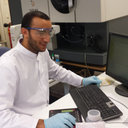About
19
Publications
8,384
Reads
How we measure 'reads'
A 'read' is counted each time someone views a publication summary (such as the title, abstract, and list of authors), clicks on a figure, or views or downloads the full-text. Learn more
40
Citations
Introduction
Organic Phytochemist expert in Isolation, identification, and Analysis of Bioactive compounds from Natural Sources. I have mastered many techniques and skill sets, such as extraction and purification of natural products using various chromatography techniques. Structure elucidation of natural products including analytical, spectroscopic and spectrometric methods. Working knowledge of most common chemical databases and software packages.
Imad Mennai currently works at the Department of Chemistry, University of Constantine 1.
Additional affiliations
January 2013 - present
Publications
Publications (19)
The aim of the present study was to evaluate and compare the chemical composition, antimicrobial, antiparasitic, and cytotoxic properties of the essential oils extracted from Rhanterium adpressum Coss. & Dur. (EORA) and Rhanterium suaveolens Desf. (EORS). The main compounds of EORA were myrcene (18.51%), α-pinene (14.36%), sabinene (13.55%), β-pine...
This study evaluates the chemical composition, antimicrobial, antiparasitic, and cytotoxic activities of essential oil extracted from Rhanterium intermedium Pomel (EORI) leaves. The chemical composition of the essential oil was analyzed by GC/MS analysis. In addition, the antimicrobial capacity of EORI against five pathogenic bacteria and two yeast...
Abstract: The anticholinesterase and antioxidant activities with chemical composition and molecular docking of essential oil and nonpolar extracts of Mentha piperita were evaluated using enzymatic and chemical methods. Molecular docking tools were used to explain the interaction of the major chemical constituents with the enzymes. GC/MS analyses re...
The ongoing pandemic of COVID-19 is causing more health, economic and social issues worldwide. As of July 5, 2021, the world registered more than 184 million cases across 222 countries; more than 4 million have died from the deadly infection. The SARS-CoV-2 continues spreading globally; new variants emerge randomly due to errors in the virus' gRNAs...
Pesticides are chemicals used to fight agricultural pests. Their use causes extensive damage to both humans and animals, resulting in diseases mainly affecting the respiratory and digestive systems. Through this study, we evaluated the pneumotoxicity caused by a deltamethrin (DM) insecticide at a dose of 0.64mg.kg-1.day-1. We also evaluated the pre...
Pesticides are chemicals used to fight agricultural pests. Their use causes extensive damage to both humans and animals, resulting in diseases mainly affecting the respiratory and digestive systems. Through this study, we evaluated the pneumotoxicity caused by a deltamethrin (DM) insecticide at a dose of 0.64mg.kg-1.day-1. We also evaluated the pre...
The extensive use of Lambda-cyhalothrin (LCT) has been associated with the various toxicities that non-target organisms can undergo including mammals. However, the mechanism of induced-LCT cytotoxicity in animal brain cells is still elusive, particularly in brain regions, notably the hippocampus, an area directly involved in cognitive function. Thi...
This work aimed to investigate, for the first time, the chemical composition, antioxidant, antiparasitic, cytotoxicity, and antimicrobial activities of the aromatic plant Limonium oleifolium Mill. essential oil (EO) and organic extracts. L. oleifolium aerial parts essential oil was analyzed by GC‐FID and GC–MS, and 46 constituents representing 98.2...
Protozoan pathogens that cause neglected tropical diseases are a major public health concern in tropical and developing countries. In the course of our ongoing search for new lead compounds as potential antiprotozoal agents, this study aims to perform a bio-guided fractionation of Pituranthos battandieri, using an in vitro assay against Leishmania...
The present work focuses on evaluation of the chemical composition and antioxidant
activity of the hydro-methanolic extract of Melissa officinalis from Algeria. The liquid
chromatography-mass spectrometry analysis allowed the identification of six compounds: caffeic
acid, caftaric acid, hydroxyjasmonic acid glucoside, caftaric acid glucoside, ro...
This study was performed on the derived fractions [chloroform (FT-C), ethyl acetate (FT-E) and n-butanol (FT-B)] of the 70% ethanol extract prepared from Frankenia thymifolia, endemic to North Africa. The fractions showed high total phenolic and flavonoid contents particularly FT-E. These results agreed with their antioxidant effects. Indeed, all t...
InCites Journal Citation Reports by THOMSON REUTERS (Web Of Science)
the link
https://drive.google.com/file/d/0B4aqIJ2U503gcWFnODRUVVNiNWM/view?usp=sharing
The genus Pituranthos of the family Apiaceae includes more than 20 species among which four are present in Algeria. Many Pituranthos species are used in folk medicine and are rich sources of bioactive compounds. The essential oils, extracts of this genus are reported to possess antifungal, antimicrobial, immunomodulatory, anticancer and antioxidant...
IX èmes Journées Internationales de Chimie de Constantine 8-9 novembre 2015
Un grand nombre de plantes ; aromatiques, médicinales, des plantes épices et autres, possèdent des propriétés biologiques très intéressantes, qui trouvent applications dans divers domaines à savoir en médecine, pharmacie, cosmétologie et l’agriculture. Les plantes sont depuis toujours une source essentielle de médicaments. Aujourd’hui encore une ma...
Les substances naturelles issues des végétaux ont des intérêts multiples mis à profit dans l’industrie : en alimentation, en cosmétologie et en dermopharmacie. De plus, les plantes sont depuis toujours une source essentielle de médicaments. Aujourd'hui encore une majorité de la population mondiale, plus particulièrement dans les pays en voie de dév...












































